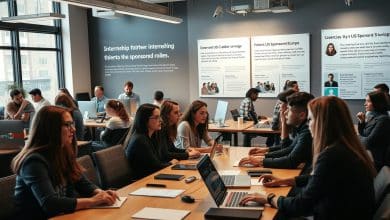Which Networking Strategies Help International Students Get Hired Faster?
International students face unique challenges when entering the competitive United States job market. Visa restrictions, cultural differences, and limited local connections create significant hurdles. Building professional relationships becomes essential for career success.
Career development experts reveal a striking statistic. Approximately 80% of all positions are filled through professional connections. This makes relationship-building one of the most critical skills for job seekers.
MaryEllen Ryan, senior associate director at Bentley’s Pulsifer Career Development Center, offers valuable insight. She emphasizes that effective networking focuses on meeting new people and building genuine connections. It’s not about transactional interactions for personal gain.
Many international students find networking intimidating. Cultural backgrounds where self-promotion is less common can create discomfort. However, these skills can be learned and improved with consistent practice.
This article explores proven approaches that international students can implement immediately. Readers will discover evidence-based techniques from top career development professionals. These methods help accelerate job searches and establish strong industry presence.
Preparation: Setting the Stage for Effective Networking
Career development specialists consistently highlight that proper event preparation separates casual attendees from strategic networkers. Thoughtful groundwork transforms intimidating professional gatherings into manageable opportunities for international students.
Gather Essential Materials and Rehearse Your Approach
Before any professional event, students should assemble key business materials. This includes updated business cards, a professional portfolio, and a system for organizing contacts. These tools demonstrate preparedness and professionalism.
Rehearsing self-introductions builds confidence, especially for non-native English speakers. Practice helps deliver key talking points smoothly. This preparation mirrors the polished presentation expected on LinkedIn profiles.
Setting Clear Objectives for Each Event
Specific goals transform vague networking into focused business development. Students might aim to connect with ten professionals or target specific companies. Measurable objectives provide direction and purpose.
Time management skills become crucial at events with limited windows for interaction. Researching attendees beforehand allows for thoughtful questions. This preparation shows genuine interest and cultural awareness.
Networking Strategies: Building Connections with Confidence
Building genuine professional relationships requires more than just exchanging business cards. The psychological approach students bring to interactions often determines their long-term success. MaryEllen Ryan from Bentley’s career development center notes that reframing networking as relationship-building transforms the experience.
Developing a Positive Mindset for Networking Success
International students benefit from viewing professional gatherings as opportunities to learn rather than perform. Genuine curiosity about others’ experiences creates natural dialogue. This approach reduces anxiety and makes conversations more memorable.
Adopting an abundance mindset helps students avoid desperate behavior. Believing sufficient opportunities exist for everyone creates relaxed, positive interactions. Career professionals emphasize that everyone shares the common goal of making meaningful contacts.
Avoiding Hard Sales Tactics and Focusing on Relationship Building
Effective networking focuses on mutual benefits rather than immediate transactions. Students should avoid aggressive job-seeking behavior that damages trust. The primary goal should be establishing rapport that may lead to future collaboration.
Patience and authenticity create lasting professional bonds. Valuable relationships develop through multiple touchpoints over time. This long-term perspective distinguishes successful networkers from those seeking quick fixes.
Networking represents an opportunity to meet new people and build connections versus reaching out for personal gain.
These approaches help international students build credibility and trust. The most valuable connections often emerge from shared interests and genuine dialogue. This foundation supports career growth beyond immediate job searches.
Engaging in In-Person Events and Online Communities
Successful career development for international students involves mastering two complementary environments: physical events and virtual communities. Both platforms offer unique advantages for building professional relationships.
Tips for Navigating Live Networking Events
Career fairs and industry conferences provide invaluable face-to-face interaction opportunities. Students should approach each encounter with confidence and cultural awareness.
A firm handshake, direct eye contact, and genuine smile create immediate rapport. Actively moving around the room maximizes contact opportunities. Avoid staying in comfortable corners with familiar faces.
Leveraging LinkedIn and Social Media Channels Effectively
Digital platforms offer access to vast professional networks. LinkedIn connects students with thousands of alumni and industry professionals.
Creating standout profiles requires studying successful professionals in target roles. Profile photos should show professional attire and approachable expressions. Employers frequently research candidates through social media channels.
Joining Industry Forums and Professional Groups
Online communities provide ongoing connection opportunities. Industry-specific forums keep members informed about trends and news.
Participating in discussions demonstrates expertise and builds credibility. These groups connect students with professionals sharing similar career interests. Regular engagement strengthens professional relationships over time.
Mastering the Elevator Pitch and Professional Persona
The first impression a person makes often determines the direction of a professional conversation. Career experts stress that preparation for these moments separates successful candidates from others. International students benefit greatly from mastering this crucial skill.
An effective elevator pitch distills background and career goals into 30-60 seconds. It should highlight unique skills and accomplishments without sounding rehearsed. This introduction opens the door for meaningful dialogue rather than serving as a monologue.
Crafting a Concise and Impactful Elevator Pitch
Students must adapt their message for different audiences. A global leader might value international experience, while technical roles require specific skills. Preparing multiple versions ensures relevance to various people and situations.
Practice with mentors helps refine delivery and build confidence. Students receive feedback on how others perceive their presentation. This process improves both content and delivery of their elevator pitch.
Beyond the initial introduction, students should prepare for follow-up questions. These often concern career goals or interest in a specific company. Thoughtful responses demonstrate genuine engagement and preparation.
Effective Relationship Management for Career Growth
The true value of professional interactions emerges after the initial meeting concludes. Career experts emphasize that follow-up represents the most critical phase for international students. Without proper relationship cultivation, even excellent first impressions fade quickly.
Following Up to Strengthen New Connections
Timing matters greatly when reinforcing new contacts. Students should send follow-up messages within one to two days after meeting someone. This prompt action demonstrates professionalism and genuine interest.
Effective messages express appreciation for the person’s time and reference specific conversation insights. Mentioning a particular discussion point shows attentive listening. This personal touch distinguishes meaningful follow-ups from generic templates.
Regular check-ins maintain relationships without becoming burdensome. Students should reconnect every few months with substantial updates about their progress. Sharing educational achievements or internship experiences provides natural reasons for contact.
Maintaining a Record of Interactions and Opportunities
Detailed records prevent valuable details from fading from memory. After meeting multiple people, students need systems to track conversations. Notes about discussion topics and personal details enable personalized follow-ups.
Professional platforms like LinkedIn offer excellent tools for monitoring contacts’ career movements. Noting promotions or new certifications creates future opportunities for reconnection. Acknowledging others’ achievements demonstrates genuine interest in their success.
Quality relationships typically yield better outcomes than numerous superficial connections. Building deeper bonds with fewer contacts often proves more valuable. This approach creates a strong foundation for long-term career development.
Overcoming Challenges as an International Student in the US Job Market
Navigating the American employment landscape presents distinct obstacles for international scholars seeking professional placement. Cultural adaptation becomes essential for career advancement in unfamiliar business environments.
Bridging Cultural Differences and Professional Expectations
International candidates encounter visa limitations and unfamiliar business customs. Understanding American workplace dynamics requires careful observation and adaptation.
Many students come from cultures where self-promotion feels uncomfortable. They must develop new communication skills while maintaining personal authenticity. Starting with familiar contacts builds confidence gradually.
Classmates, professors, and family friends provide safe practice environments. These initial connections often lead to unexpected professional opportunities. Every conversation holds potential value for career growth.
Cross-cultural experiences become unique assets during professional interactions. Companies increasingly value diverse perspectives and global understanding. Students should highlight these strengths when discussing potential roles.
Building support systems through campus organizations provides essential guidance. Mentors who understand visa considerations offer practical advice. This network creates a foundation for long-term career development.
Language barriers diminish through consistent practice and active listening. Clear communication about work authorization prevents misunderstandings. Persistence and resilience ultimately lead to professional success.
Conclusion
The journey toward career success for international students fundamentally relies on cultivating meaningful professional bonds. Research confirms that most job opportunities arise through these personal contacts rather than public listings.
Students who dedicate time to building their professional circle consistently achieve better outcomes. They gain access to unadvertised roles and receive valuable support throughout their career development.
Effective networking requires viewing each conversation as a chance to learn. Showing genuine interest in other people creates relationships that may yield future opportunities.
Cultural adaptation and consistent practice transform initial discomfort into confidence. The effort invested in these skills pays dividends across a person’s entire professional future.
FAQ
What are the most effective ways for international students to prepare for networking?
How can someone build genuine connections without being too pushy?
What is the best way to use LinkedIn for career development?
Why is an elevator pitch important for career opportunities?
How should someone follow up after meeting a new professional contact?
What challenges do international students face in the US job market?
Published on: 15 de October de 2025

Galena Garcia
Galena Garcia is the visionary behind Portal Santista. With a degree in Business Administration and a specialization in Marketing for the financial sector, Galena brings years of experience from the corporate world, where she developed a deep passion for helping both businesses and individuals thrive financially.
Driven by a desire to share her knowledge with a broader audience, she founded Portal Santista—an online space dedicated to providing useful, practical, and reliable information on finance, marketing, and business management.
Outside of her professional life, Galena is an animal lover, a devoted reader of romantic novels, and loves spending fun moments with her nieces and nephews. Her unique blend of technical expertise and genuine care for people is what makes Portal Santista such a special place.






